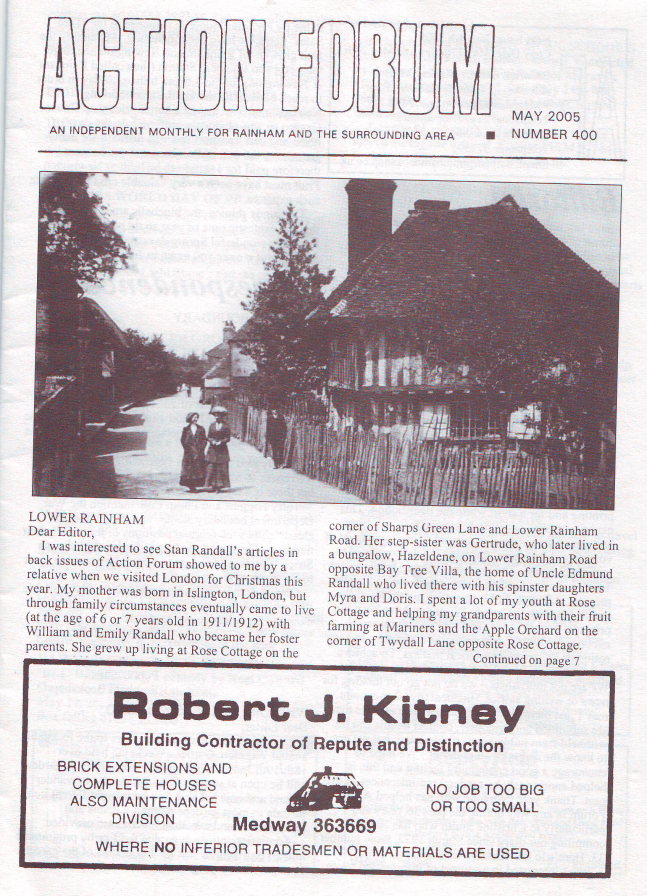The pushchair was tantalisingly out of reach, hanging, draped in coal dust - covered cobwebs, from the rafters of the outhouse. Despite standing on the unstable mound of a couple of hundredweight of nutty slack the boy could not touch this object of desire. "Mum, can I have the pushchair that's in the coal shed?" "Why?" "Because I want the wheels". "What for?" "To make a barrow. Can I Mum?" "No, it may be needed again some day". What could it be wanted for? After all, I had long been able to get around on my own two feet. It took some years for the penny to drop! And it never was needed again. A four-wheeled soap-box, with rope steering and a wooden block hand brake which pressed onto a rear Wheel tyre, and based on two planks and a box was the dream of many a lad. But it took a lot of searching to find a couple of pram axles complete with wheels. We convinced ourselves it was better to have small wheels at the front, large at the rear, because finding two axles with same size wheels was highly unlikely. My friends Ivan and Brian Baldock's dad was a good bet for the planks, as he always had a good supply of timber to be sawn and split for fire lighting. We would help with this chore to remain in his good books. All that then remained was to get Father to part with a decent fruit box. This was almost impossible. Every bushel box had stencilled upon it the name of the London market commission agents who sold our produce. They loaned the boxes free, but this was on the understanding that any not eventually returned would have to be paid for, to the tune of 4 or 5 shillings, so the best we could hope for was a broken one.
Once we had a barrow up and running we felt we had moved on from the worn -out motorcycle tyre and a 15-inch baton with which to bowl it along. Now we Could have fun. Except that for every free ride one person had, another had to do the pushing.
Pump Lane, Cutters Lane bridle path and the orchards of Bloors and Pump Farms were our playground. It was perfectly safe to play football at the junction of these lanes, which formed a sizeable triangle, because so few vehicles passed, and we knew when the regulars would be along. The arrivals of milkman, baker, coal merchant, grocer, hardware van, even the bicycle - mounted insurance agent were never a surprise, so predictable were they. This was not so with the lorries, but we could hear them coming from a long way off. The Pump Farm buildings were an unattractive lot, to put it mildly. The only ones with any character (a single rounded oast, some cart sheds and a fairly large single storey store) were in a neglected and dilapidated state. The rest were of metal framed and corrugated sheet construction. The largest was of almost aircraft hanger size and appearance, dominating the site, with smaller lean-to additions, and a small separate building used as an office. This was no longer a farmyard. It was, from I believe the 1930's, a road haulage depot, an out-post of Mr Greenwood's transport company of Ramsey in Huntingdonshire (now Cambridgeshire).
The locally based lorries, running under the name Medway Transport were A.E.C. 6 and 8 wheeled flatbeds; a lorry and trailer, and several ex--army Bedford 5 tonners. Maintenance man and Jack-of-all-trades Austin Clark, a member of the family who have owned this farm and its surrounding land for many years, had converted these in house. He removed the original metal drop-side bodies and built on wooden platform ones. Frank: Rose tells me that when delivering groceries he would sometimes see Austin repairing the lorries' tarpaulin sheets by hand. The comings and goings of these vehicles, resplendent in their dark brown livery with orange sign writing were of great interest to us boys, as some of the drivers, including the late Don Clark, who wrote several pieces for A.F., and the late Alfred Smith, elder son of "Pop" and Sue Smith who I have mentioned in a previous article, were well known to us.
We found it fascinating to think: that when we heard Alf s 15 former groaning up the lane late on a Friday afternoon, this was the end of a return trip to Scotland that began on Monday morning. Bear in mind that the speed limit for that class of vehicle at that time was 20 mph, and the speed achieved on a long uphill drag when loaded was little more than walking pace. Alf served in the R.A.F. during WW2, and with his hgv experience was given the job of driving a "Queen Mary", the articulated 60 foot long aircraft recovery vehicle in, I believe, North Africa. Back to Medway Transport when demobbed, he was kind enough to take me on a couple of trips during school holidays, a practice which of course would be frowned upon today by all and sundry, but which I enjoyed enormously. Every summer two beautiful sky blue A,E.C. coaches would call in at the depot on their way down from Ramsey to pick up the local drivers for the works outing to Margate.
From Pump to Russett (sic)? Well in the last few years the buildings have been demolished, every last trace of Pump Farm's agricultural and industrial history swept away, and a housing estate of 25 units has arisen, their brick and timber construction paying, I suppose, some lip service to "tradition". And if the developers thought it appropriate to use the name Russet (t) Farm in acknowledgement to the apple orchards which Surround the site, and a particular variety to be found therein, then surely they could have got the spelling correct.
Stan Randall











































































































































